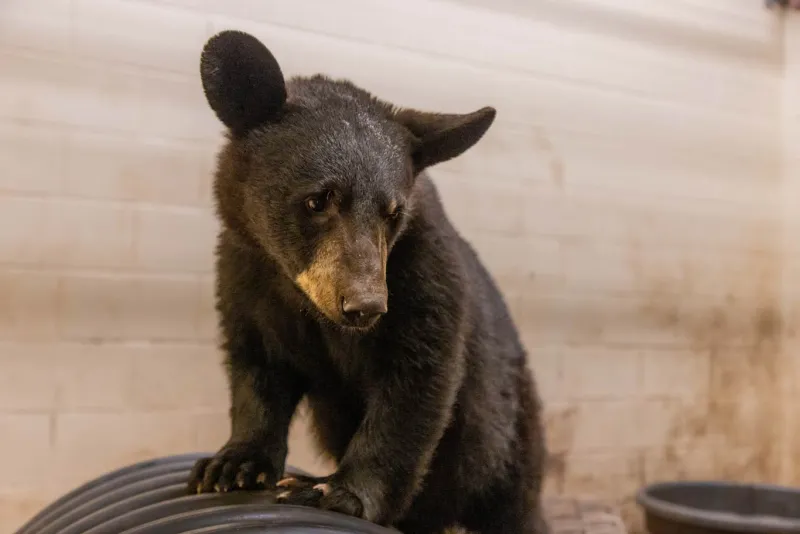Like clockwork, almost every spring, orphaned black bear cubs arrive at the North Carolina Zoo's Schindler Wildlife Rehabilitation Center (WRC) for rehabilitation and release back into the wild. The Zoo's WRC is one of two facilities in the state of North Carolina permitted to rehabilitate bear cubs due to their knowledge and experience.
In spring 2022, a male black bear cub was confiscated from a private individual and brought to the WRC. Upon arrival, the cub was estimated as 8-10 weeks old, and it was evident the cub was malnourished, weighing significantly less than a cub at his age should. Obviously, the cub had not been receiving the proper care it needed. He immediately showed signs of habituation toward people upon arrival. Habituated bear cubs come towards humans instead of trying to hide or retreat from them. The cub also called out to the rehabbers and wanted to stay near them.
At this age, the cub would still be nursing with his mother, as cubs will nurse for six to eight months before weaning. This cub missed these important months with his mother. Hand-assisted nursing requires handling the cubs, but even then, you need to be as “hands-off" as possible to avoid continued habituation. Finding this balance can be challenging, but our trained rehabbers know what specific type of care is needed during this young and delicate age.
During rehabilitation, we transition bear cubs to formula in a bowl as soon as possible, based on each cub's needs and development. Feeding from a bowl allows the cubs to learn to provide for themselves, limiting further human interaction. However, this cub resisted feeding from a bowl so much that he even ignored it. He was hyper-fixated on the humans he could see and hear. Getting the cub to drink from a bowl was challenging, but the WRC staff persisted and ultimately succeeded.

One of the WRC team’s biggest challenges was integrating him with the other bear cubs in the rehabilitation center. He could not understand bear cues from other cubs and would get overly excited and aggressive toward them. He didn't know how to be a bear cub! He climbed doors to get to people while the other bear cubs hid. It was clear he had no fear of humans, which also posed a threat to the caretakers.
State biologists with the North Carolina Wildlife Resource Commission (NCWRC) ultimately determined that the bear cub could not be released into the wild because he was not equipped with natural skills to survive in the wild by himself, AKA: be a bear. There was also great concern that he would continue to seek contact with humans. As male black bears can grow to weigh around 400 pounds and stand up to 7 feet tall, this poses a very dangerous threat to people.
Unfortunately, this cub's "wild" life was stolen from him because the private citizen did not contact the NCWRC when the orphaned cub was found. However, he will help educate the public about why wild animals are unsuitable pets and serve as an ambassador for his wild counterparts at an accredited Association of Zoos and Aquariums venue, where he'll be well cared for the remainder of his life.
Pictured Above: Black bear cub on his way to his new home. He is recovering from anesthesia here, after having a pre-shipment exam to ensure he is healthy.
Always contact the NCWRC (866-318-2401) or the appropriate agency in your state/area if you are concerned about sick, injured, or orphaned wildlife instead of trying to intervene on your own. Don't assume young animals are orphaned just because you don't see the adult around. Many species instinctively "tuck away" their offspring when leaving to find food. Making the best choices to give animals the best chance at life in the wild is essential.
To find out more about the NCWRC’s black bear cub rehabilitation program, please visit their website.




